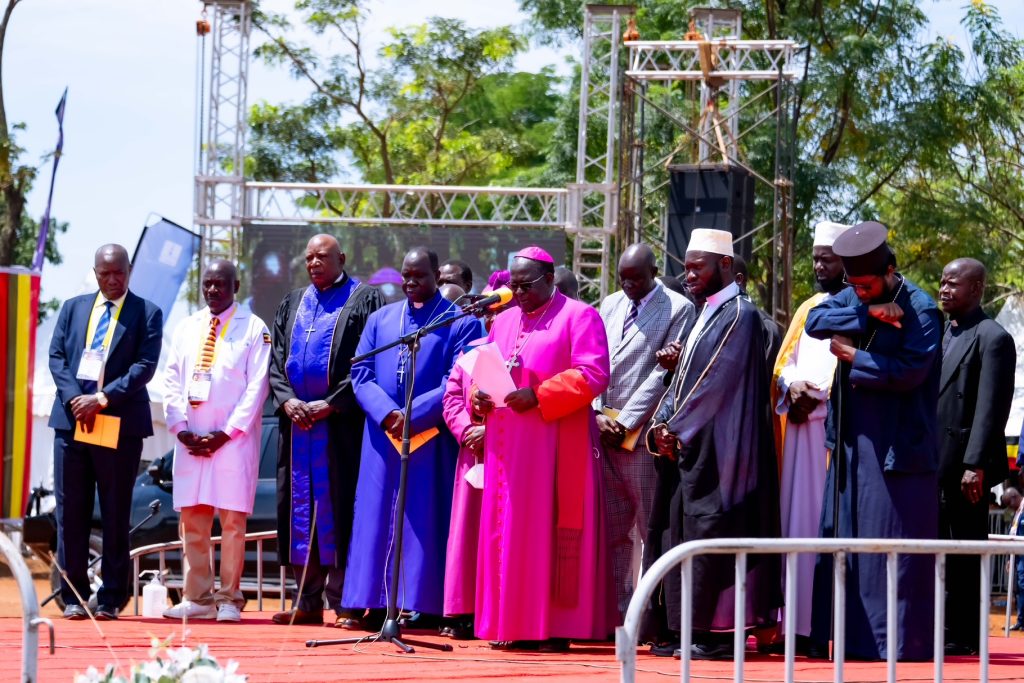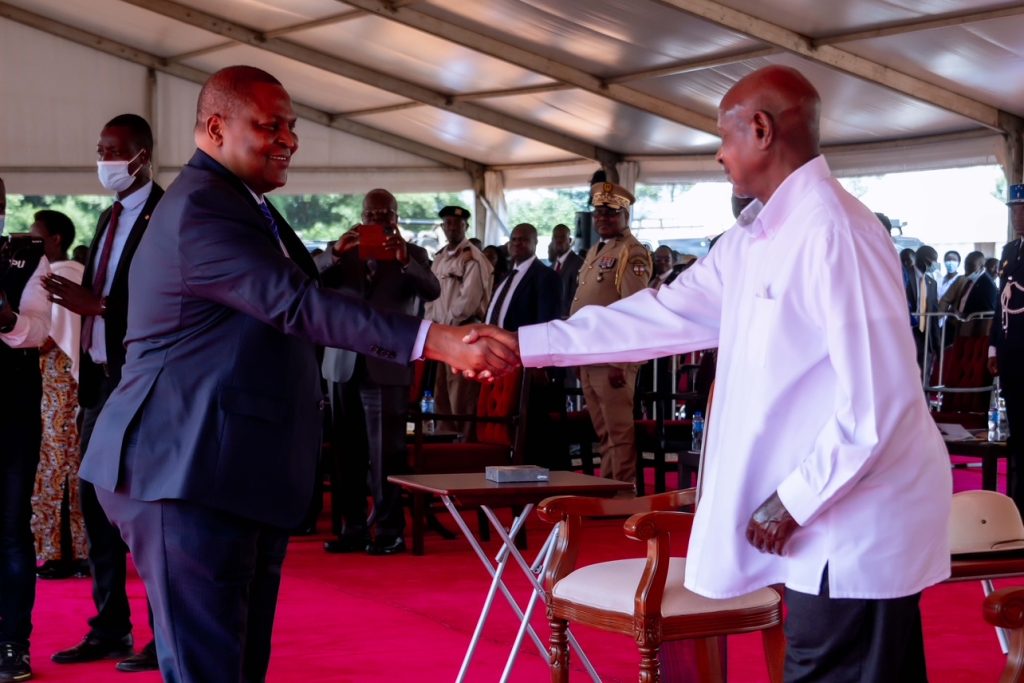“With the four ideological principles, and the three historical missions, we have been able to achieve progress in five phases; the minimum recovery of the enclave economy, expanding the small island of the money economy, diversifying the economy, adding value to the raw materials and promoting industrialization and entering the knowledge economy,” he said.
President Museveni who was in company of his counterpart , His Excellency Faustin Archange Touadéra , the President of the Central African Republic made his remarks today while officiating the 62nd Independence Day Anniversary celebrations.
H.E Touadéra commenced his three-day official visit to Uganda yesterday.
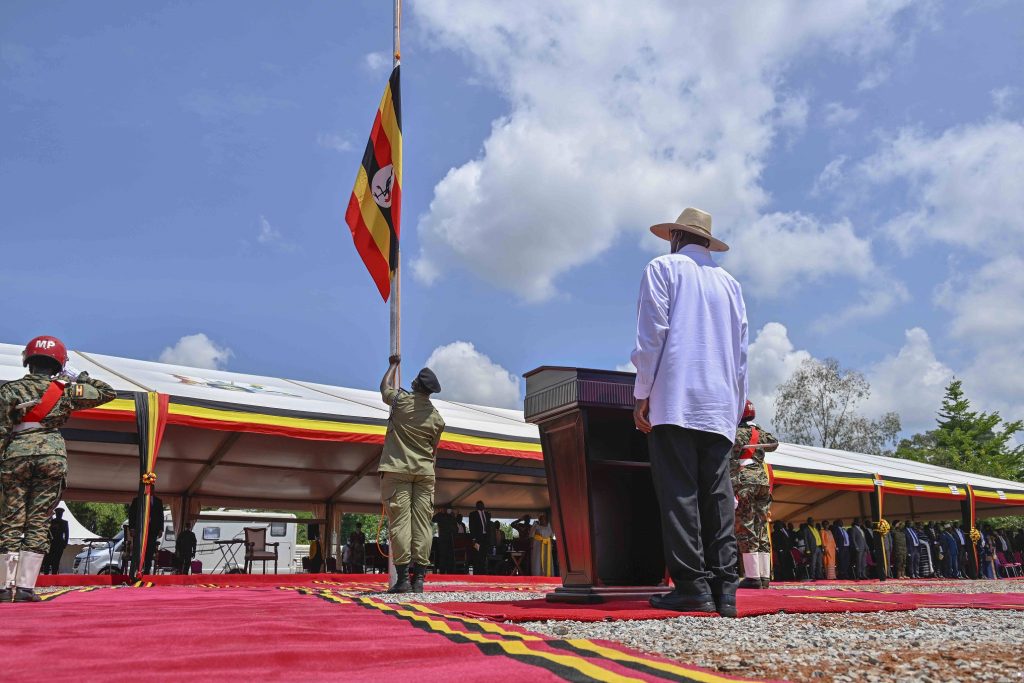
The colorful event was held at Busikho Teachers Demonstration Primary School grounds in Busia District.
The celebrations ran under the theme: “Independence Day: A Recommitment to Secure and Fortify Our Destiny”.
According to the President, all the zones, tribes, religions or the gender groups of Uganda, need Uganda for their prosperity and affluence.
“Once a zone produces goods or services, the next assistance to the effort of wealth and affluence creation would come from other zones of Uganda, that is why Uganda became very crucial for the wealth creation of the different zones. That is how we came up with the first principle of the NRM- patriotism. Love Uganda, why? It is because you need it for your prosperity,” he said.

“However, soon we discovered that even Uganda was not enough, we needed East Africa and Africa for a bigger market. Hence our second principle of Pan-Africanism. Love Africa, why? It is because you need it for your prosperity.”
President Museveni also noted that the country cannot produce modern goods and services unless it promotes socio-economic transformation from the capitalist modes of social organisations.
“Hence our third ideological principle of socio-economic transformation. Our fourth ideological principle is democracy so that people are able to hold their leaders accountable for their actions or inactions.”
The President also revealed that the historical missions of the NRM which include prosperity, strategic security and using the brotherhood of the African people to achieve the two, have been key in keeping the government focused as far as the journey of transforming Uganda is concerned
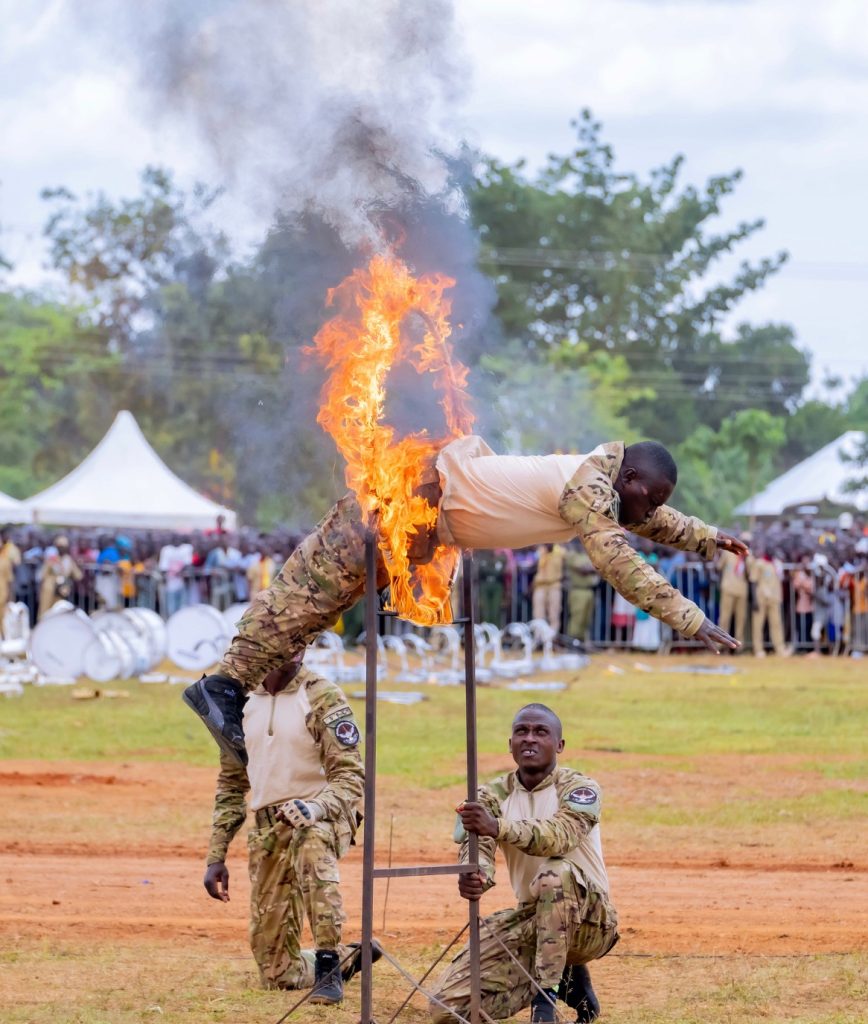
He also implored the citizens to add value to Uganda’s raw materials if the country is to achieve the desired socio-economic transformation.
“We realised the big problem of Africa and other colonies has been the issue of producing only raw materials. This has been a disaster for Africa. Uganda may get USD 2.5 per kg of bean coffee, the same kilogram roasted and turned into coffee powder and packed outside may fetch USD 40. As a consequence of this, from a global value of coffee of USD 460 billion, the coffee growing countries in the world get only USD25 billion and Africa gets only USD2.5 billion,” he said.
“Germany, a non-coffee growing country, earns USD 65 billion more than all the coffee growing countries in the world. This is how the colonies and neo-colonies have been donating money, jobs and development Energies to Europe and North America. Therefore, we have been deliberately taking steps to end this betrayal by African leaders. In spite of the opposition, we have succeeded in some items like milk, textile, tin, cement, gold, cassava etc.”
On the other hand, the President assured Ugandans that the country has already successfully entered the knowledge economy of automobiles, vaccines, pharmaceuticals, computer assembling, among other products.

He further stated that for an immediate plan of boosting the economy, the government is working on the railways and other vital infrastructure.
“With our oil resources, we are going to fund this. The importance of the railway is to lower transport costs thus making it easier for businesses to make profits. We are already handling electricity. With low costs of doing business, Uganda becomes more attractive to business operators,” he said.
“It is estimated that by the end of June 2025, the economy of Uganda will be $57.5 billion by the exchange rate method and $163 billion by the PPP method. That’s even before extracting our oil. By maintaining our steady focus on various initiatives, we are set to grow our economy to $500 billion.”
President Museveni also urged Ugandans to take advantage of the government programs like the Parish Development Model (PDM) and Emyooga to join the money economy.
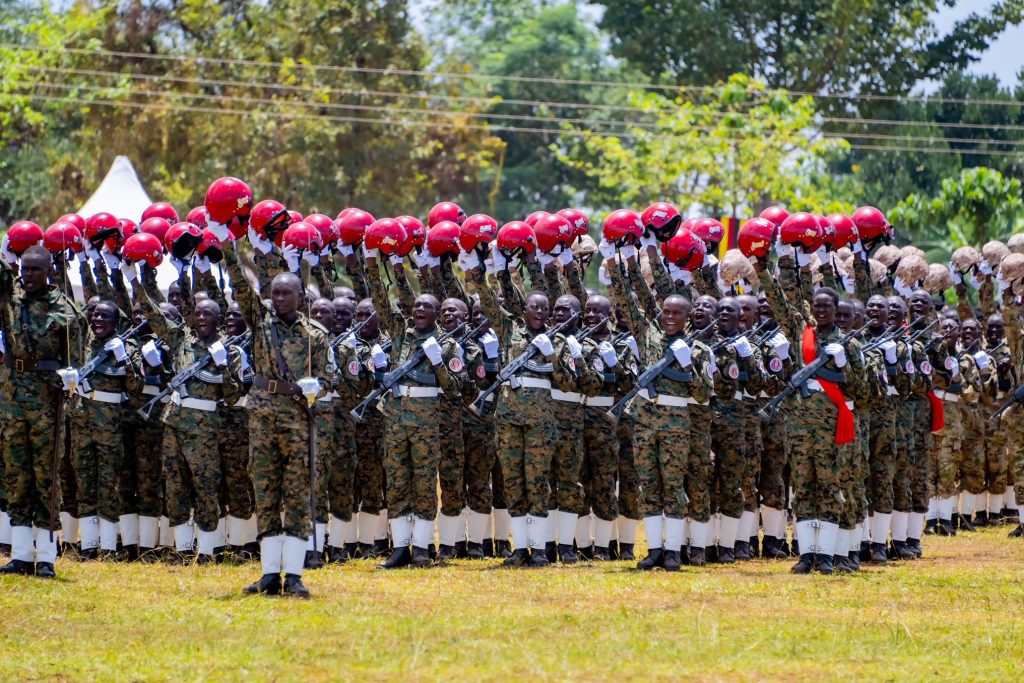
“According to the latest census data, 67 percent of our people are in the money economy because of our initiatives like PDM, Emyooga, NAADS. It is the 33% that are still out of the money economy.”
On the other hand, President Museveni thanked H.E President Faustin-Archang Touadéra of the Central African Republic for agreeing to join Ugandans as they celebrate the independence anniversary.
“The Central African Republic will become a good trade partner for East Africa. Central Africa is just after Congo and South Sudan and together with Central Africa we want to persuade the government of Congo and that of South Sudan that we work on the roads that connect East Africa to the Central African Republic,” he said.
“As we are working on that, I invite the Uganda Airlines and our air cargo companies to look at the possibility of flying to Bangui a few times so that we can link up with our brothers and sisters.”
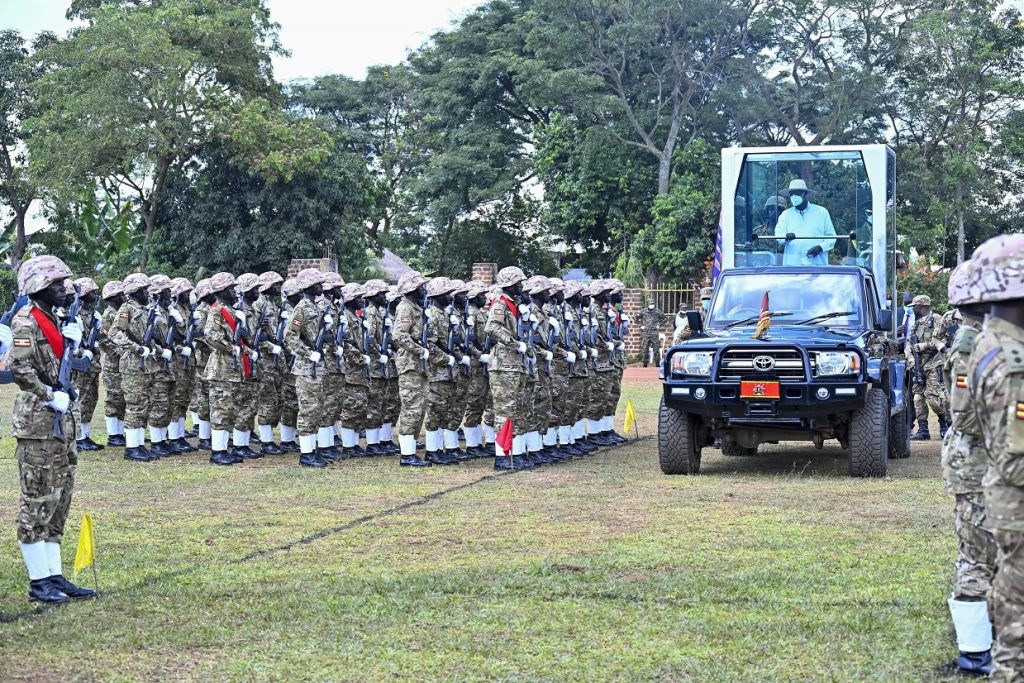
Furthermore, President Museveni commended the UPDF Chief of Defense Forces (CDF), Gen. Muhoozi Kaneirugaba for rationalising the army parade by making it shorter.
“Instead of the army parade standing there the whole day, they have now done their part and they have gone.”
The Central African Republic, President H.E Touadéra expressed his deep appreciation and thanks to President Museveni for inviting him to participate in the important celebrations.
“We are very much honoured to be here to celebrate Uganda’s 62nd Independence Day anniversary. We wish you a happy Independence Day,” he said.
President Touadéra also thanked President Museveni for transforming Uganda through his able and wise leadership.

“Allow me to specifically thank President Museveni for effectively representing the people of Uganda for all these years. He has indeed transformed Uganda into a good country of national reconciliation. We came here because he is a person who inspires us a lot.”
The Minister for Presidency, Hon. Babirye Milly Babalanda informed the President that a section of Ugandans are still locked up in the mentality of working only for the “stomach”, ignoring the commercial value of their product, saying that this is one of the biggest challenges that have delayed Uganda to attain middle income status.
“However, I commend the NRM leadership for promoting commercial agriculture and enabling every Ugandan to enter the money economy,” she said.
Hon. Babalanda also thanked God for preserving President Museveni’s life who has played a crucial role in transforming Uganda.
“You have proved that one can have a chance and use it maximumly for the benefit of millions of Ugandans. Your Excellency sir, I wish to commend your leadership for the stability and socio-economic transformation of this country.”
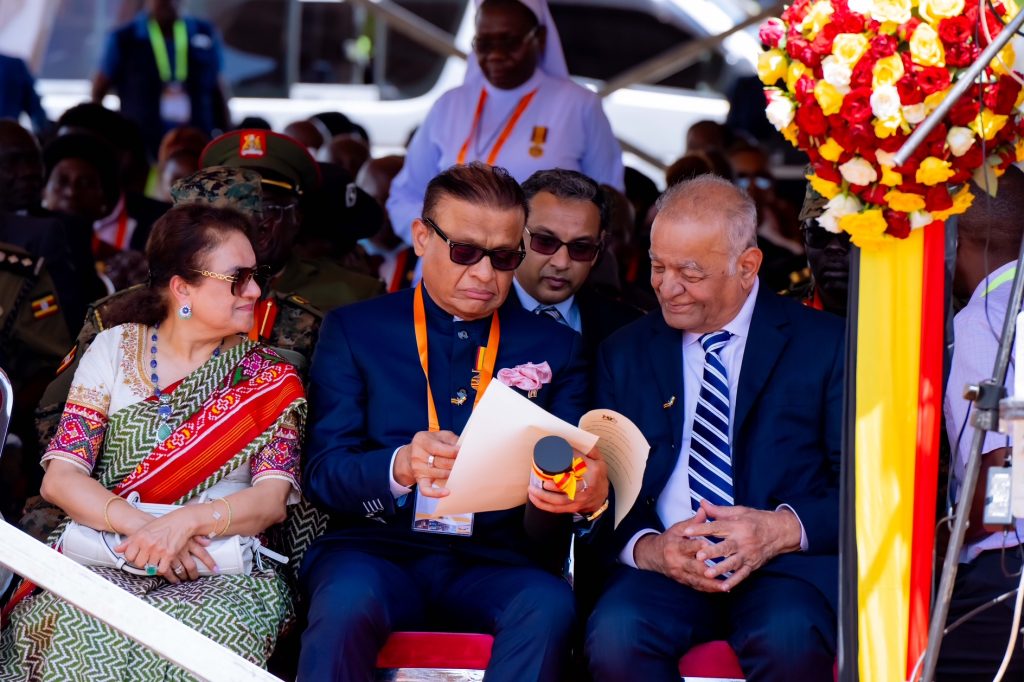
At the same event, 40 distinguished Ugandans were awarded with medals for their exceptional contribution towards the development of Uganda.
The event was also attended by the Vice President, H.E Jessica Alupo, Chief Justice, His Lordship Alfonse Owiny-Dollo, the Deputy Speaker, Hon. Thomas Tayebwa, First National Vice Chairman of NRM, Alhaji Moses Kigongo, the Prime Minister, Rt. Hon. Robinah Nabbanja, the First Deputy Prime Minister, Rt. Hon. Rebecca Kadaga, 3rd Deputy Prime Minister, Rt. Hon Rukia Nakadama, NRM Secretary General, Rt. Hon. Richard Todwong, Ministers, Members of Parliament, Security Officers, Members of the Diplomatic Corps, cultural and religious leaders, among others.
